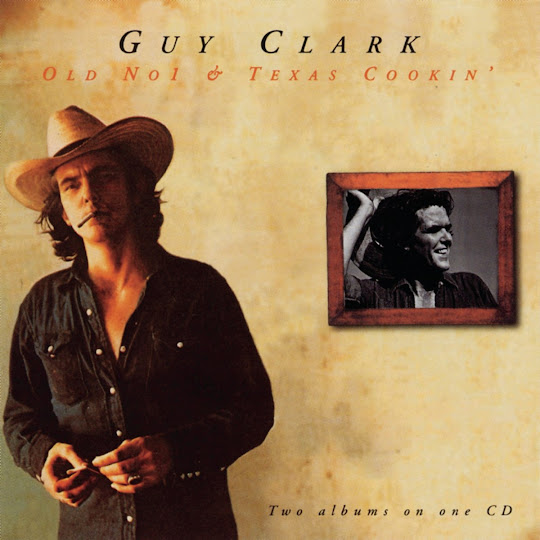I bought this CD on a whim from the sale rack at Tower Records in 2006. Back in the '90s, labels took advantage of the CD craze (which had about twice the capacity of a 12" LP) to take 2 albums from their catalogues, bundle them together, & market them as a 2-in-1 value. Today this seems desperately tacky (probably why they were filling discount bins as early as 2006), but in the '90s it seemed like more bang for your buck. This compilation by Camden Records reissued Guy Clark's first 2 albums, Old No. 1 (1975) & Texas Cookin' (1976).
Old No. 1 contains his most well-known songs: "L.A. Freeway," which Jerry Jeff Walker had a hit with in 1972, & "Desperados Waiting for a Train," which the outlaw country supergroup The Highwaymen took to #15 in 1985. Those 2 songs deserve their reputations, but every other track on Old No. 1 is equally good. I've always loved "She Ain't Goin' Nowhere," a portrait of a bruised but unbroken woman striking out on her own that opens with the beautiful line "Standing on the gone side of leaving." The mid-album ballad "That Old Time Feeling" is another gem (with backing vocals by Emmylou Harris!)--a catalogue of poetic images that attempt to capture rueful nostalgia, each more poignant than the last: "That old time feeling draws circles around the block/Like old women with no children holding hands with the clock."
As a lyricist, Clark is at his best when he's writing about regret, loss & the passage of time. As a songwriter & arranger, his secret weapon is the anthemic chorus--the huge hook that seems to come out of nowhere, sweeping over the listener like an overpowering wave. Both of these traits are on display in the album's 2 most famous tracks. To all appearances, "L.A. Freeway" is a simple song about moving away from the big city. But in Clark's hands--and underneath the sparse instrumentation, ghostly harmonica & steel guitar visiting but not staying--it encompasses the whole gamut of emotion: the relief of moving on, the fear about being able to handle what's next, the strength of love & the hope of second chances. To me, the L.A. Freeway is any wrong turn you take in life, any unwise detour that you just pray you can make it back from. I've been on a few L.A. Freeways in my life, & luckily I've made it off them without getting killed or caught, but the outcome was far from certain.
"Desperados Waiting for a Train" is about Clark's grandfather getting old & dying, but in a larger sense it's about the essential sadness of the American mythology. The chorus image is one taken from any number of western movies: hardbitten men standing on a train platform. Why are they waiting for the train? Are they going to rob it? Are they fleeing town? Are they leaving their lives of crime behind? It turns out, at the end of the song, that the train is death--the only outcome we can be sure of. "One day I looked up & he was pushing 80/and there's brown tobacco stains all down his chin/Well to me he was one of the heroes of this country/so why's he all dressed up like them old men?"
The 2nd album on this disc, Texas Cookin', is a slight step down from Old No. 1, with fewer memorable songs & a more "Nashville" feel to the production (you can really hear it in the glossy drums). This one for sure has its standouts, though, like the opening title track, a rollicking ode to the cuisine of Clark's home state. I appreciate that he mentions Mexican food as well, & doesn't just limit his tribute to white people Texan food. "Anyhow, I Love You," a love ballad for the lost & disappointed, is another highlight, with harmony vocals by Emmylou Harris, Rodney Crowell & Waylon Jennings. Waylon's distinctive voice shows up again on another album standout, the closer "The Last Gunfighter Ballad." Almost a sequel to "Desperados," it is a meditation on the decay of American myths in the face of marching modernity--& questions whether those myths were worth glorifying to begin with.
Guy Clark is one of the greatest country songwriters of his generation. Part of the same Texas scene that produced Townes van Zandt, Blaze Foley & Steve Earle, he equals or surpasses all of them with a poetic sensibility reminiscent of fellow Texan Kris Kristofferson. The record-store purist in me still has a little shame about having bought the cheesy 2-in-1 CD, but it led me to these songs, so I really can't be anything but grateful.

No comments:
Post a Comment